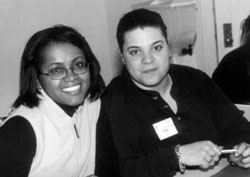New Teacher Institute Increased Support Allows Services to Expand in New York and Across the Nation
Research shows that recruiting the best teachers, preparing them at the highest levels, and assisting them through their transition into teaching has enormous influence on children. Teachers College created the New Teacher Institute in order to help do this.
Published Tuesday, Sep. 18, 2001
